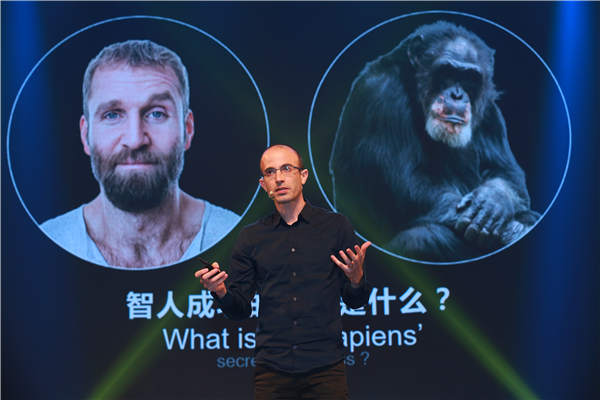
Pop-science author draws big audiences with his perspective on our species
To many people's surprise, a book on anthropology by an Israeli historian captivated Chinese readers, as it did audiences all over the world.
Yuval Noah Harari, a 40-year-old history professor with Hebrew University of Jerusalem, might be the first writer ever to present an author's show in China on his global best-seller Sapiens: A Brief History of Humankind.
The book is currently Amazon's 74th global best-seller among English titles. It's published in 43 versions in different languages. Facebook's CEO Mark Zuckerberg has listed it as his book of the year for 2015.
Harari is also a popular TED speaker and online course lecturer with 110,000 followers.
When he faced an audience of about 2,700 in Beijing Expo Theater in late April, Harari was like a rock star. The audience listened attentively through almost four hours to the very end, some of them reluctant to leave. There were 140,000 more who paid to watch his show live via streaming websites.
"It's my first time in China. I didn't expect and am much impressed by the young in the audience," Harari tells China Daily. His assistant calls the China trip "his most intense book tour".
Shu Ting, editor from the China Citic Press and the show's organizer, says Harari's ideas of putting our everyday life back into macro-history, and that Homo sapiens, our far ancestors, differed from other animals with the ability to tell and believe in fictional reality, have influenced and inspired many in China, including business leaders, scientists and young people.
Shu says the press has printed 600,000 copies, and two-thirds are sold. According to TouTiao.com's big data survey, 3.56 million readers in the country are interested in the book, 68 percent of whom are between 18 and 23 years old.
"Money is a fictional story we're told, as well as empire, religion and more," Harari says.
"We believe money, a piece of paper, can be exchanged for a real banana, but the chimpanzees won't.
"In this sense, bankers are better storytellers than the Nobel literature winners."
Wu Ningchuan from TMTPost.com even calls the book an internet Bible, which is especially enlightening to internet business and startups.
"Internet business is about the ability to create and tell new stories, and the goal of making money through selling 'happiness' to users, as Harari states in his book," Wu says.
Harari himself is a wonderful storyteller, too - from WeChat to his book's stories from ancient Chinese history.
"It is important for me to communicate well with the audience in different countries," he says.
"Examples are to make it easier for the readers to understand and they need to be familiar to the reader."
He is one of the rare and smart writers who would change seven to eight examples and offer a customized academic book to a different market.


















































